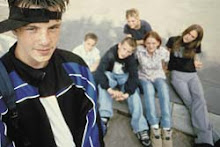Source: Connect with Kids
Troubled Teenagers? See How the Teenage Mind Works
Are you dealing with the emotional rollercoaster of raising a teenager? Teens are impulsive, stubborn and moody. A troubled teenager will yell at you one minute and hug you the next. What’s a parent to do? Get The Teenage Brain and see the latest research to help you understand defiant teenagers and how their mind actually works. You’ll improve your parenting skills and learn how to influence troubled teenagers and how to better communicate with them.
Find out what makes defiant teenagers tick.
New research shows that there are clear-cut, physical differences between an adult’s brain and a teenager’s brain – differences that explain typical “teen behavior.” The Teenage Brain is a compelling video program that gives families with troubled teenagers hope while providing the latest facts, tips from experts, advice from health practitioners, stories from teens themselves and much more.
When it comes to teenagers, you can never have enough parenting skills.
If you have teens, part of your job is to develop their mind. New research shows that you can actually shape the structure of your child’s brain – so shouldn’t you understand how troubled teenagers' or defiant teenagers' brains work? Now you can.
“It’s important for parents to understand how the brain works because the brain is incredibly responsive to experiences, and the kind of experiences that parents provide can actually shape the structure of the brain.”
- Dr. Daniel J. Siegel, M.D., child
Friday, January 30, 2009
Sunday, January 11, 2009
Parents Universal Resource Experts - Sue Scheff - Teen Gangs
Teen Gangs and Teen Cults
Gangs prey on the weak child that yearns to fit in with a false illusion they are accepted into the “cool crowd”. With most Gangs as with Teen Cults, they can convince your child that joining “their Gang or Cult” will make them a “well-liked and popular” teen as well as one that others may fear. This gives the teen a false sense of superiority. Remember, many of today’s teens that are acting out negatively are suffering with extremely low self confidence. This feeling of power that they believe a gang or cult has can boost their esteem; however they are blinded to the fact that is dangerous. This is how desperate some teens are to fit in.
In reality, it is a downward spiral that can result in damage both emotionally and psychically. We have found Teen Gangs and Teen Cults are sometimes hard to detect. They disguise themselves to impress the most intelligent of parents. We have witnessed Gang members who will present themselves as the “good kid from the good family” and you would not suspect their true colors.
If you suspect your child is involved in any Gang Activities or any Cults, please seek local therapy* and encourage your child to communicate.
This is when the lines of communication need to be wide open. Sometimes this is so hard, and that is when an objective person is always beneficial. Teen Gangs and Teen Cults are to be taken very seriously. A child that is involved in a gang can affect the entire family and their safety. Take this very seriously if you suspect your child is participating in gang activity or cult association.
Learn more click here.
Need help - visit www.helpyourteens.com
Gangs prey on the weak child that yearns to fit in with a false illusion they are accepted into the “cool crowd”. With most Gangs as with Teen Cults, they can convince your child that joining “their Gang or Cult” will make them a “well-liked and popular” teen as well as one that others may fear. This gives the teen a false sense of superiority. Remember, many of today’s teens that are acting out negatively are suffering with extremely low self confidence. This feeling of power that they believe a gang or cult has can boost their esteem; however they are blinded to the fact that is dangerous. This is how desperate some teens are to fit in.
In reality, it is a downward spiral that can result in damage both emotionally and psychically. We have found Teen Gangs and Teen Cults are sometimes hard to detect. They disguise themselves to impress the most intelligent of parents. We have witnessed Gang members who will present themselves as the “good kid from the good family” and you would not suspect their true colors.
If you suspect your child is involved in any Gang Activities or any Cults, please seek local therapy* and encourage your child to communicate.
This is when the lines of communication need to be wide open. Sometimes this is so hard, and that is when an objective person is always beneficial. Teen Gangs and Teen Cults are to be taken very seriously. A child that is involved in a gang can affect the entire family and their safety. Take this very seriously if you suspect your child is participating in gang activity or cult association.
Learn more click here.
Need help - visit www.helpyourteens.com
Sunday, January 4, 2009
Sue Scheff - Impossible Kids? Possible Answers!

In 1989 FAUS produced a 21-minute videotape called "Impossible Kids? Possible Answers!" It was designed as an introduction to the Feingold Program and includes interviews of families on the program, plus footage of Dr. Feingold.This film has now been converted to a DVD format.
To keep the cost low, the disk comes in a paper envelope, not a plastic jewel case.Since the filming, a few things have changed: The children in the film have grown up, the FAUS Foodlist & Shopping Guide is much larger, and there are new studies. But aside from that, little has changed -- families are still baffled by their child's behavior problems and many are still searching for answers, and finding them in the Feingold Program.
Subscribe to:
Posts (Atom)



